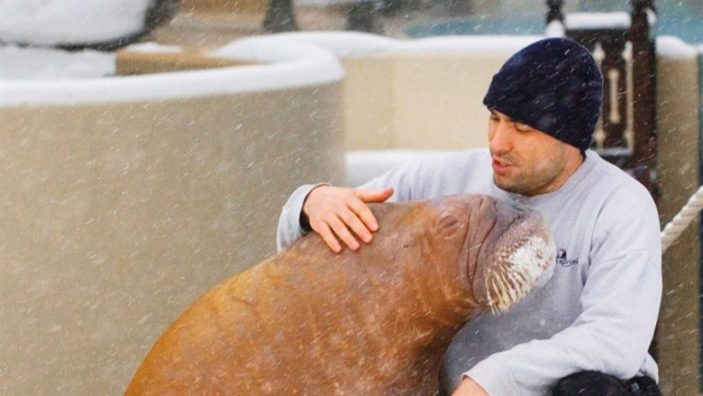
Lots of us know Free Willy but what about Free Smooshi? The latter campaign started after a former trainer at Canada’s Marineland water park went rogue. He took to Twitter to make allegations about animal abuse at his former employer. The documentary, The Walrus & the Whistleblower tells this sad story.
Nathalie Bibeau directs this film, which actually plays out more like a character study of Phil Demers. He is the whistleblower in this piece and Smooshi is the walrus. Demers is a former animal trainer turned animal rights advocate. While it is admirable to examine his sacrifices and fight against this former employer, you can’t help but feel like this narrative is too focused on him rather than the plight of the defenceless creatures.
As so much of this film centres on Demers, your enjoyment will hinge upon whether you like Demers as a person. And he is not a likeable character. He cooks up large steaks for a barbeque one moment and then at another point he provokes the masses on Twitter with: “Life is short. Steal a walrus.” By his own admission, Phil believes he is an asshole and at times he seems proud of this fact. His legal battle rages on because his former employer persists in trying to silence him. It’s pretty clear that Marineland’s founder, John Holer and Demers are both incredibly stubborn characters.
The thing that really should matter in this film is the animals. And, Bibeau does use some archive and news footage, as well as performing talking head interviews with various activists. It should come as no surprise that Marineland refused to participate in this story, which does leave things feeling somewhat one-sided. Bibeau also includes rather graphic footage of animals being mistreated. It’s gut-wrenching to watch, especially when you consider that some had received chemical burns from chlorine when the water filtration system was broken. Demers also talks about using food deprivation to train animals. Audiences who are easily distressed by these kinds of scenes should be warned.
This film often lacks context about some things. It describes how Smooshi – the walrus that Demers ultimately became imprinted on – was stolen from her mother (who we are advised, was likely killed). No information is given about why people undertake the latter, heinous act. We see Demers arguing in Canadian Parliament but we don’t get much input from animal experts. The audience is assumed to have knowledge about the differences between the goings-on behind the scenes at an animal sanctuary versus an aquarium, for instance. This was a lost opportunity to educate and inform viewers.
As it stands, there are many gaps in this film. Too much time is devoted to the minutiae of Demers’ daily life. We see him on his mail route (his new job), lying in a bathtub and talking about taking his elderly cat to the vet. But this means that the really important stuff (like the marine life) play second fiddle in what should really be their story.
The Whistleblower and the Walrus ultimately tackles some important issues. The problem is that it fails to look at the broader issues of animal conservation and welfare, by getting too bogged down in Demers’ dry legal battles. What could have been an illuminating and informative documentary akin to Blackfish instead makes for unsatisfying viewing. The Whistleblower and the Walrus ultimately gets drowned out by its emphasis on insignificant details, rather than the animals it ought to be spotlighting.
![]()
![]()
![]()
![]()
![]()
TWO STARS (OUT OF FIVE)
The Walrus and the Whistleblower streams online and on-demand as part of the Transitions Film Festival. For more information head HERE.
